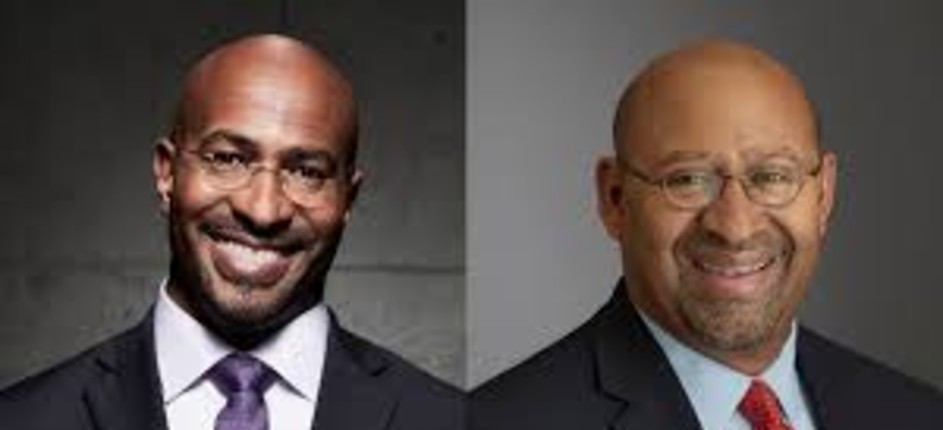Righting the Wrongs on Public Policy, Civil Unrest and COVID-19
Van Jones and Michael Nutter engage in a lively discussion at this year’s David N. Dinkins Leadership and Public Policy Forum at SIPA.
First held in 1995, the annual David N. Dinkins Leadership and Public Policy Forum at Columbia’s School of International and Public Affairs (SIPA) has long provided a platform for elected officials and scholars to address challenging issues facing urban policies, programs, and initiatives.
This year’s forum was held online on July 9, and featured a conversation between Van Jones of CNN and the Reform Alliance and Michael Nutter, 98th Mayor of Philadelphia, and the inaugural David N. Dinkins Professor of Professional Practice in Urban and Public Affairs at SIPA. ABNY, the Association for a Better New York, a coalition of the city’s business, labor, nonprofit, and political leaders, co-sponsored the event.
In their conversation, Jones and Nutter talked about the societal inequities exposed by COVID-19, systemic racism, opportunities to repair policy and bring about a more just and equitable society.
On Inequities in American Society
Slavery and racism are not ancient wrongs, said Jones in noting that his mother and father were born and raised in a segregated society. “I didn’t say my great-grandmother or my great-grandfather,” he underscored. “I was born in 1968 and I am the first person in my family who was born with all my rights recognized.”
In talking about the murder of George Floyd, Jones said, “when a billion people [saw] a lynching on their on their smartphones, I think it shocked the conscience of the world. And everybody moved the issue of structural racism, systemic racism, whatever you want to call it, higher up on their list.”
And now, he added, a much larger “constituency of consciousness,” spanning different demographics, recognizes the existence of systemic racism and the need for meaningful police reform
On ‘Defunding’ the Police
Jones decried the weight of impunity in law enforcement.
“If you have a sense of impunity, someone's going to abuse their power. And if you do that in a country where there are disfavored ethnic minorities those disfavored ethnic minorities are going to catch hell. [But] saying that the police should obey the law should not be a radical proposition in America.”
Although he might not agree with the terminology, Jones said he respected the passion of people calling for police defunding.
“The good point that they're making, which I think has not been made before with as much force, is that we do have an imbalance in our city budgets. We're asking the police to do too much” when we ask them to fill so many functions for different populations, he said.
“Giving the police a more narrow mission and then taking the savings from that so you can do other stuff — I would call that rebalancing budgets,” Jones said.
Nutter added: “Budgets are a statement of principles and values. And if you want more funding on the human side, the social service side, the community side, then those are decisions that people make—in city halls, state capitals, the halls of congress and the White House all the time.”
Lots of Data, No Wisdom
Nutter suggested that the coronavirus has revealed deficiencies in “virtually every system in the United States of America.” He cited jobs, supply chains and broadband, as examples, among others.
“We have sick people because we have sick systems,” said Jones, noting that disadvantaged communities in the United States have grappled with health problems in disproportionate numbers even before the COVID-19 pandemic arrived. “We have a lot of sick systems in terms of food and medicine and health and wellness.”
Jones continued: “The main message of the virus is the message about oneness and wellness.” While technology makes it easy to forget, especially among the elite, he emphasized that Americans remain closely connected. “If you ask me how to describe the 21st century society, it’s massive amounts of data, and no wisdom to be found. These algorithms are just driving us further and further apart.”
23RD ANNUAL DAVID N. DINKINS LEADERSHIP AND PUBLIC POLICY FORUM
The Opportunity to Repair and Move (Policy) Forward
Jones suggested that demographic change creates a lot of anxiety. If we are asking the white majority to go from being a majority ethnic group to a minority ethnic group, do progressives have a strategy to make that more or less easy?
“When Mandela was addressing the change that the white minority was going to have to go through in South Africa, the way he talked about it was much more uplifting than the way I hear us talking about it.”
Jones said that he was “passionate about figuring out how we use this election to put forth… a more unifying rhetoric that shows, how out of this breakdown you can have a breakthrough where we're all better off, and we all have a country we all like a lot more. We’ve got to start talking in that way or I'm afraid we're going to spiral away from each other.”
The Role of Young People
Jones said young people bring new energy and new perspectives to political and social movements, and the current generation is no exception. But he also exhorted them to be strategic in pursuing a constructive dialogue across generations.
“The difference that I see with the young people today is that they have more power than they know…. Because of their size, and because of their social media, they actually can have a massive impact on the direction of things.”
